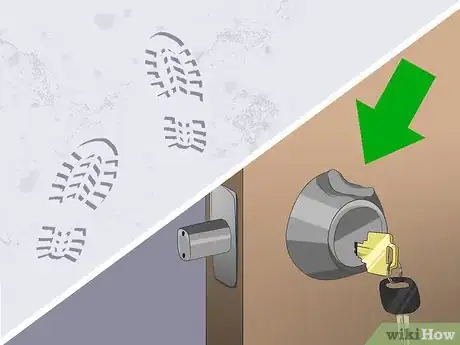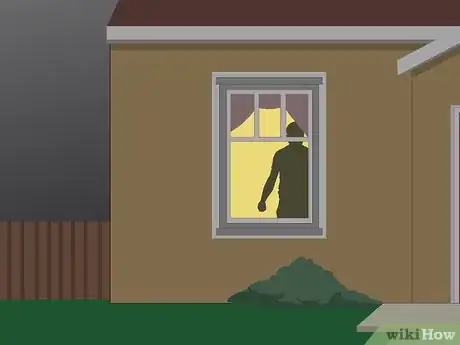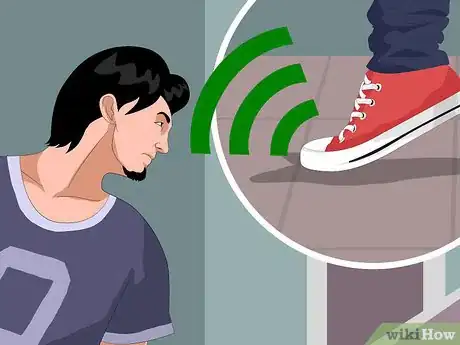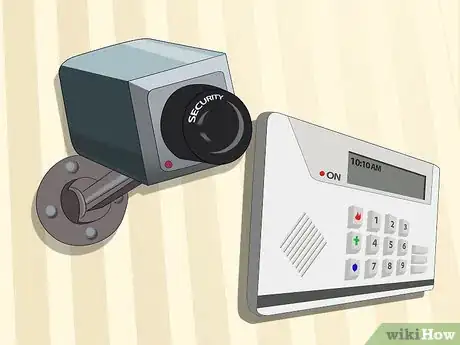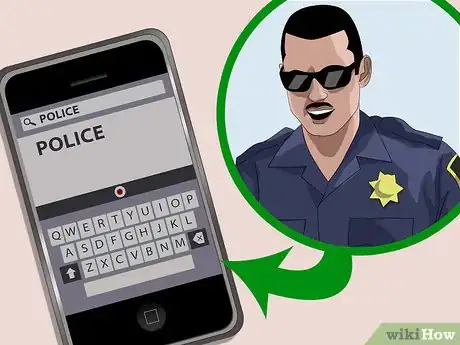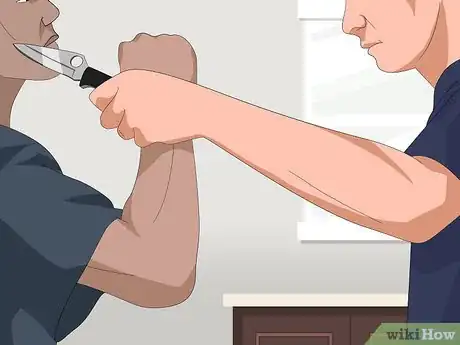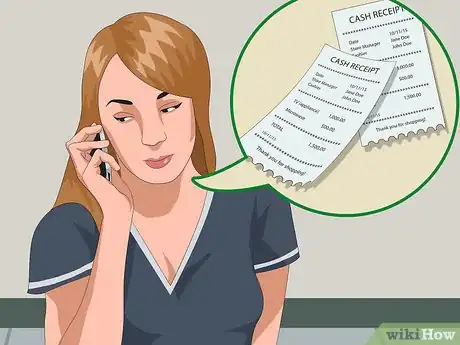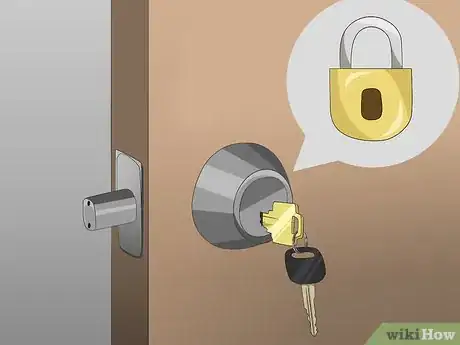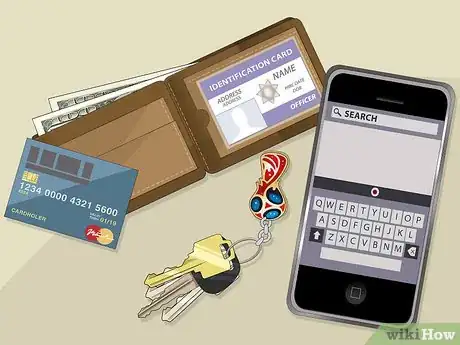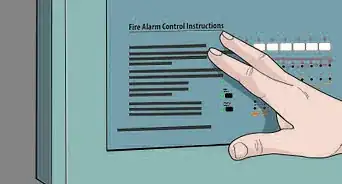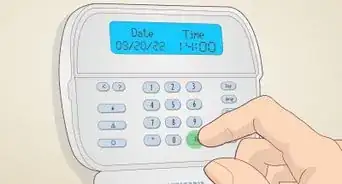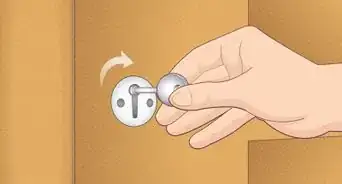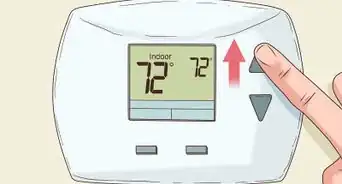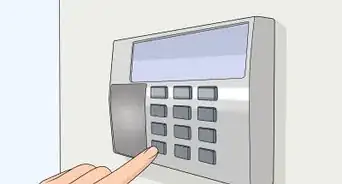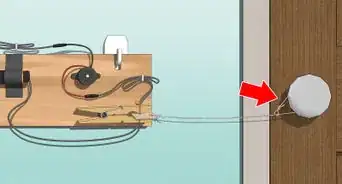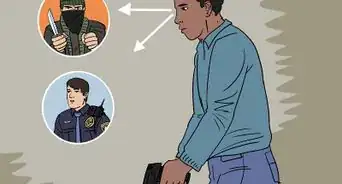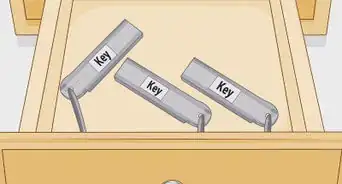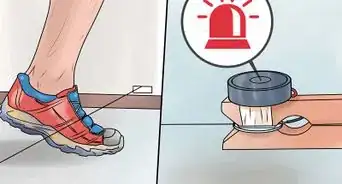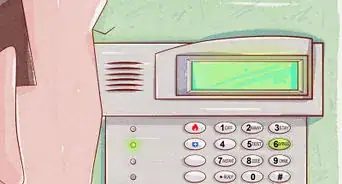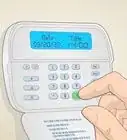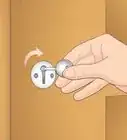This article was co-authored by Saul Jaeger, MS. Saul Jaeger is a Police Officer and Captain of the Mountain View, California Police Department (MVPD). Saul has over 17 years of experience as a patrol officer, field training officer, traffic officer, detective, hostage negotiator, and as the traffic unit’s sergeant and Public Information Officer for the MVPD. At the MVPD, in addition to commanding the Field Operations Division, Saul has also led the Communications Center (dispatch) and the Crisis Negotiation Team. He earned an MS in Emergency Services Management from the California State University, Long Beach in 2008 and a BS in Administration of Justice from the University of Phoenix in 2006. He also earned a Corporate Innovation LEAD Certificate from the Stanford University Graduate School of Business in 2018.
There are 14 references cited in this article, which can be found at the bottom of the page.
wikiHow marks an article as reader-approved once it receives enough positive feedback. This article has 11 testimonials from our readers, earning it our reader-approved status.
This article has been viewed 283,011 times.
Few things are as serious a violation of our personal sanctity as a home invasion. With a little planning and home security, you'll never be confronted with a stranger in your house. If you are, call the police and follow their instructions.
Steps
Gathering Evidence That Someone is in Your House
-
1Look at the outside of your house. If your door is ajar and you left it locked, you can be sure someone is inside. Alternately, you might notice a window which is open or smashed in, or a door handle which has been dented as if by a hammer or other heavy object. These signs indicate that someone is in your house who shouldn't be there.[1]
- If there is snow on the ground, you might be able to see strange footprints leading to or from the back or side of your home.[2] Consider this evidence that someone is in your home.
- You could also look for a strange vehicle parked in your driveway or at the edge of your yard. A vehicle parked in close proximity to your home might be a getaway vehicle.
-
2Look inside your house. There are many visual clues in your home that might indicate someone is inside. You might also see lights on inside that you didn't leave on when you left. These visual clues constitute evidence that someone is in your house. You might also see a person or persons moving around when you look through the windows.
- In some cases, a home invader gets a little too comfortable in your home and ends up passed out or asleep. Check the couch and beds to discover if someone is in your house.[3]
- When you walk inside your house, look at the floor. If you see muddy footprints across your floor with a tread that does not belong to you or anyone living in your house, a stranger is in your house.[4]
- Similarly, a burglar who walked in from the rain might leave wet footprints in their wake.[5]
- If you see any evidence that someone is in your house, exit immediately and call the police.
Advertisement -
3Listen for evidence that someone is in your house.[6] Listen for sounds that occur at regular intervals. A regular pattern of movement could be the sound of footsteps padding up or down the stairs. You might also hear an irregular pattern of movement, like the creak of a door being opened or closed, or the sudden knocking or breaking sound of someone bumping into something in the dark.
- Some sounds which indicate someone is in your house are more dramatic and obvious than others. For instance, the crash of a window being broken is an easy way to identify if someone might be in your house. If someone is trying to enter your house, you might hear a doorknob being turned, or a door rattling as a criminal tries to force it open.
- If you hear these or similarly suspicious sounds, call the police immediately and follow their directions.
- Listen carefully if you hear a strange sound. It might just be the wind, or another housemate moving about.
-
4Check the alarm system. If you have a home alarm system installed, you should be able to hear the sound of it playing loudly in the form of regular beeps or a siren-like sound when you approach your house. If your system includes a digital camera setup, you might be able to check the video feed online with your phone or laptop, even if you are not at home. Do so to discover whether someone is in your home.
- If possible, spring for a wireless alarm system.[7] About one quarter of all burglars reported cutting telephone or alarm system wires before entering their target home. Wireless technology will make this impossible.[8]
- Many alarm systems will automatically contact the authorities for you. Some contact you instead. If your alarm system goes off, or you come home and find it has been triggered, exit the house and contact the police immediately.
Taking Action When You Suspect Someone Is In Your House
-
1Call the police.[9] If you are outside your house and see signs of forced entry, call the authorities immediately. Police are trained to deal with home invasions and will assume the risk of checking the house for you. If you're inside the house and within sight of an exit, go outside and remain there until the police come. If you can go to a neighbor's house in the interim, or call a friend to wait with you in your car outside, do so.
- If you're inside the house and cannot easily leave, close and lock the door of the room you're in and quietly call the police.
- Ensure you know how to speed-dial the police before you need to do so. In the heat of the moment, it can be hard to dial even a simple number like 911.
- Be sure to obtain a copy of the police report after they've finished conducting their walk-through; you will need this later to file an insurance claim if anything has been damaged or stolen.
-
2Call out to the person who might be in your house. If you think you hear someone you know, like a friend or family member, call their name. If nobody replies, ask again in a more general way to let the intruder know that you know they are there. Ask in a loud, curious tone, “Is someone there? If someone is there, come out now.” This will alert the person in your house that their cover is blown. Hopefully, they will flee and avoid confrontation.
- Another way to panic the intruder and get them to flee is to hit the alarm on your car. If you have your keys handy, set the car alarm off with the panic button on your key fob. This will also alert your neighbors to the fact that you're in trouble.
-
3Make no sound and stay hidden. Staying quiet can help avoid a confrontation. Move quickly but quietly to a closet or hide under the bed. Rooms which are unlikely to be of interest to the thief like the bathroom are good places to hide as well. Slow your breathing and stay out of view. Whatever hiding place you choose, don't move from there until the police arrive.
-
4Cooperate with the intruder.[10] If you're caught or discovered and the person in your house demands valuables or money, cooperate with them.[11] Do not antagonize them or tell them you've called the police. Do not try to stall them by telling them incorrect locations of valuables or money, as this will only anger them.
-
5Prepare to defend yourself. Hopefully, the police will arrive in a timely manner, or the intruder will be scared off by your verbalizing. But if the intruder attacks you, be ready to act. In cases of home invasion, you will be overcome by a wave of adrenaline and feel suddenly “pumped up” and ready to act.
- Defending yourself is not the same as preemptively attacking the individual who should not be in your house. Do not engage in combat with the home invader unless absolutely necessary.
- Do not use guns, knives, or other weapons unless you are properly trained.[12] You might accidentally hurt yourself or someone you care about.
-
6Contact your insurance company. If anything was stolen or damaged, you will need to make an insurance claim. Do a walk-through of the home after the police have checked it for invaders. Check your valuables and jewelry and high-end appliances like your TVs, computers, fridge, and washer and dryer. If you have receipts and pictures of the objects which were stolen, you should include them in your insurance claim to verify its accuracy.
- Check local pawn shops after the break-in if anything was missing. Thieves may try to peddle the goods they stole on local market websites like Craigslist, so check the web, too.
Staying Safe
-
1Before heading out, make note of the house's condition. If there are little things that are always left in a certain position or condition, use these things as benchmarks to measure if your house is as you left it. For instance, perhaps you always leave the lights off in certain rooms of your house. If you come home and see the lights have been turned on and nobody else lives in your house, then it is safe to conclude that someone is in your house.
-
2Have a plan in the event of a break-in. Talk to your family or housemates about a meetup spot where everyone can assemble in the event of a break-in or other emergency. For instance, you might decide to gather your family in the meadow across the street from your house. If you have children or others who are unable to ambulate easily on their own, designate someone in the house as responsible for them.[13]
- Your plan should include a specific escape route out of each room. Will you exit via a door, window, or fire escape? Put these details in the plan.
-
3Lock your doors. It's an easy thing to do, but many people forget to lock their doors or consider it unnecessary. Locking your door when you go out and before you go to bed is the easiest way to deter robbers. Keep yourself and your family safe by locking your doors.
- If you're worried about home security or live in a high-crime area, consider getting a security door installed with double-cylinder deadbolts. A security door is an extra layer of protection in the form of a barred steel gate that only opens with a key on both sides.
-
4Keep your essentials together. Your essentials are those things you never leave your home without: wallet, keys, and phone. [14] If you're the victim of a home invasion and need to leave in a hurry or call the police, you'll be glad you have all your things together and ready to go. Keep the essentials handy in an easy-to-reach location like a backpack or on your person.
- Keep your cell phone charged at all times. At night, place your phone and your other essentials on a nightstand or on the floor beside the bed.
Avoiding Paranoia
-
1Educate yourself with home invasion statistics. Burglars rarely enter a home when someone is home for the obvious reason that they do not want to be caught. Only 28% of burglaries occurred when someone is home. A mere seven percent of burglaries ended in violence against the resident(s) of the home.[15] Less than one in ten violent crimes are committed by strangers in the victim's house.[16] Statistically, therefore, you are unlikely to have a stranger in your house.
-
2Calm down. Think about other occasions when you thought someone was in your house and, upon inspection, nobody was.[17] This time is probably no different. Don't let your mind run wild with the false belief that someone is in your house.
- Conjure calming imagery.[18] For instance, imagine yourself sitting serenely beside a beautiful lake or river.
- Practice observing your thoughts. Stay conscious of the process by which you become fearful at the possibility of someone entering your house. When you experience these thoughts, push them away and don't blindly give yourself over to the fear which they entail.[19] Imagine these fearful thoughts are red balloons. In your mind's eye, picture them floating away, one by one, into the air. Picture yourself holding only blue balloons which represent your peaceful, relaxed mind.
- Listen to some relaxing music. Slow jazz or classical are great for putting the mind at ease.
-
3Look for alternative explanations.[20] For example, if you leave a window down, you might hear a door slam due to the wind. If you have pets and hear a sudden clatter or find a broken object somewhere in your house, it might well have been caused by your pet's rambunctious behavior. Sometimes stairs creak due to the home settling. Furnaces and refrigerators turn on and off periodically. These things are normal. Consider other possibilities beyond someone being in your home when you hear a strange sound.
-
4Consider therapy if you chronically fear that someone is in your house. Cognitive behavioral therapy is a technique in which you will, with the assistance of a trained therapist, identify anxiety-based thoughts like the notion that someone is in your house and then identify if they are logical and accurate. Your therapist will help you work through the paranoid thoughts and chronic fears you have to improve your mental health.
- Your therapist might also prescribe medication to tackle underlying conditions such as anxiety, depression, and paranoia.
Warnings
- If the criminal is armed, get out of the house immediately. If you can, take a phone with you so you are able to call the police.⧼thumbs_response⧽
References
- ↑ http://www.lockpickingforensics.com/destructive.php
- ↑ http://www.upi.com/Odd_News/2016/04/19/British-police-follow-white-paint-footprints-to-burglars-home/9631461078069/
- ↑ http://www.charlotteobserver.com/news/local/crime/article56458045.html
- ↑ https://books.google.com/books?id=dMMmPP8wRakC&lpg=PP1&pg=PA228#v=onepage&q&f=false
- ↑ http://www.telegraph.co.uk/news/uknews/crime/11289548/Burglar-caught-after-neighbour-set-Home-Alone-style-water-bowl-trap...-and-then-followed-his-wet-footprints.html
- ↑ https://www.glamour.com/story/all-about-you-real-life-man-with-a-gun-glamour-april-2012
- ↑ Saul Jaeger, MS. Police Captain, Mountain View Police Department. Expert Interview. 21 February 2020.
- ↑ http://www.safewise.com/blog/8-surprising-home-burglary-statistics/
- ↑ Saul Jaeger, MS. Police Captain, Mountain View Police Department. Expert Interview. 21 February 2020.
- ↑ http://www.today.com/news/home-invasion-jeff-rossen-shows-how-protect-your-family-1D80117494
- ↑ Saul Jaeger, MS. Police Captain, Mountain View Police Department. Expert Interview. 21 February 2020.
- ↑ http://simplisafe.com/blog/what-to-do-if-youre-home-during-a-break-in
- ↑ http://simplisafe.com/blog/what-to-do-if-youre-home-during-a-break-in
- ↑ http://simplisafe.com/blog/what-to-do-if-youre-home-during-a-break-in
- ↑ http://www.safewise.com/blog/8-surprising-home-burglary-statistics/
- ↑ http://www.bjs.gov/content/pub/pdf/vvcs9310.pdf
- ↑ https://www.psychologytoday.com/blog/science-choice/201602/8-traits-paranoid-thinkers
- ↑ https://www.psychologytoday.com/blog/the-creativity-cure/201402/how-be-calm-person
- ↑ https://www.psychologytoday.com/blog/the-mindful-self-express/201506/9-ways-calm-your-anxious-mind
- ↑ https://www.psychologytoday.com/blog/science-choice/201602/8-traits-paranoid-thinkers
- ↑ https://www.glamour.com/story/all-about-you-real-life-man-with-a-gun-glamour-april-2012
About This Article
To tell if someone is in your house, start by looking for signs of entry, such as an open window or dented door handle. If you're not already inside your house, try peeking in from the outside to see if there are any lights on that you didn't leave on. You can also check near the windows and doors for unfamiliar footprints in the mud or snow. If you're indoors, listen for footsteps, doors opening or closing, and doorknobs rattling. If you notice any evidence that someone is in your house, make sure to exit immediately and call the police. For more tips, like how to take action when you suspect someone is in your house, read on!
